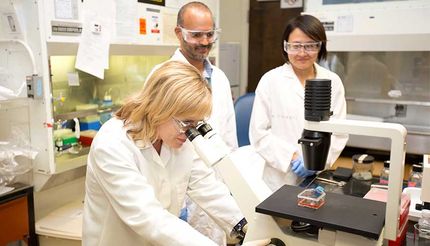UBC researchers identify potential new therapy approach for hepatitis C
Advertisement
Researchers at the University of British Columbia have found a new way to block infection from the hepatitis C virus (HCV) in the liver that could lead to new therapies for those affected by this and other infectious diseases.
"As HCV infects a person, it needs fat droplets in the liver to form new virus particles," says François Jean, Associate Professor in the Department of Microbiology and Immunology and Scientific Director of the Facility for Infectious Disease and Epidemic Research (FINDER) at UBC. "In the process, it causes fat to accumulate in the liver and ultimately leads to chronic dysfunction of the organ."
"HCV is constantly mutating, which makes it difficult to develop antiviral therapies that target the virus itself," says Jean. "So we decided to take a new approach."
Jean and his team developed an inhibitor that decreases the size of host fat droplets in liver cells and stops HCV from "taking residence," multiplying and infecting other cells.
"Our approach would essentially block the lifecycle of the virus so that it cannot spread and cause further damage to the liver," says Jean. The team's method is detailed in the journal PLoS Pathogens.
According to Jean, HCV is one of a number of viruses that require fat to replicate in the human body. This new approach to curbing the replication of HCV could translate into similar therapies for other related re-emerging viruses that can cause serious and life threatening infections in humans, such as dengue virus. Dengue is endemic in more than 100 countries, with approximately 2.5 billion people at risk of infection globally. In some countries, Dengue has become the leading cause of child mortality.
Organizations
Other news from the department science

Get the life science industry in your inbox
By submitting this form you agree that LUMITOS AG will send you the newsletter(s) selected above by email. Your data will not be passed on to third parties. Your data will be stored and processed in accordance with our data protection regulations. LUMITOS may contact you by email for the purpose of advertising or market and opinion surveys. You can revoke your consent at any time without giving reasons to LUMITOS AG, Ernst-Augustin-Str. 2, 12489 Berlin, Germany or by e-mail at revoke@lumitos.com with effect for the future. In addition, each email contains a link to unsubscribe from the corresponding newsletter.

























































